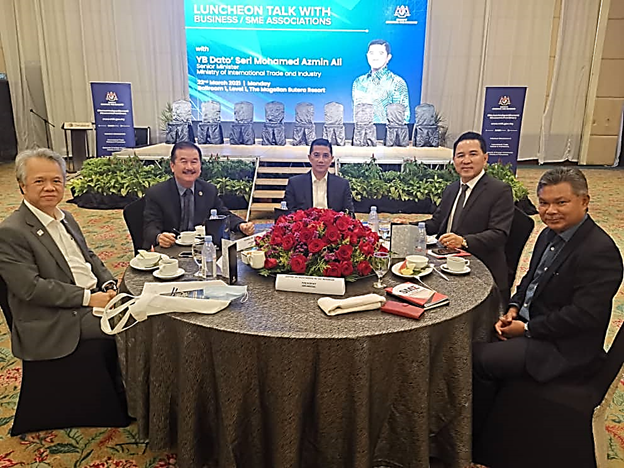
From left: Foo, Lim, Azmin, Chu and Buhtamam at the luncheon talk.
KOTA KINABALU: Small and Medium Enterprises Association of Sabah (SME Sabah) has sought Senior International Trade and Industry Minister Datuk Seri Mohamed Azmin Ali’s assistance in expediting the establishment of Free Trade Zones (FTZ) in Sepanggar, here and Palm Oil Industrial Cluster (POIC) Lahad Datu to enhance exports from Sabah.
Its president Foo Ngee Kee thanked Azmin for agreeing to look into the proposals raised by SME Sabah in a luncheon talk with business and SME associations on Monday.
“It is hoped that the Federal Government can help to expedite the setting up of a FTZ in Sepanggar Bay, here which is currently being planned by Ministry of Industry Sabah (MIDS), and also an additional FTZ in POIC, Lahad Datu due to the two ports being well equipped and upgraded to cater for the FTZ and Customs, Immigration and Quarantine (CIQs).
With the FTZ, he said Sabah can leverage on our neighbour, Kalimantan and other Brunei Darussalam-Indonesia-Malaysia-Philippines East ASEAN Growth Area (BIMP-EAGA) regions to scale up to meet the export demands.
“Currently, due to the small population of Sabah of 3.9 million people, our production volumes of agro-based products cannnot fulfill the importers requirements sustainably on a regular basis,” he said.
Foo added that the lack of plantation workers can also be addressed when Sabahans and Malaysians were to invest in Kalimantan, which has ample supply of land and workers.
He said these agriculture produce can then be brought out of Kalimantan to POIC FTZ for processing into export grades for export to overseas markets like China, Japan and Korea.
Those produce that are not up to export grades can be sold in the local market and duties paid when bringing out of the FTZ into Sabah, he said.
“In this way exporters need not pay Malaysian duties for the export items and no double handling of documents with the customs declaration.”
Foo said without sufficient economies of scale the prices for Sabah’s exports become uncompetitive, especially when the high shipping charges are included.
“In this way even though Sabah is blessed and endowed with bountiful natural resources, rich fertile soil and a great tropical climate, it can’t contribute much to Sabah’s GDP and economy.”
He further said that the FTZ will further support Sabah’s position as a primary gateway for trade with other nations within BIMP-EAGA regions.
“Sabah is strategically located in the center of the BIMP-EAGA region.
“Together with the direct connections that Sabah has with the key overseas market like China and Korea, Sabah is well poised to benefit from this role.
“Other regions in the BIMP-EAGA do not have such direct connectivity with the aforesaid markets.”
Foo stressed that SMEs in Sabah would benefit from the FTZ whereby more SMEs and jobs will be created for processing of farm produce not only from Sabah, but from goods received from BIMP-EAGA region for processing and re-export to overseas market, which will help to reduce the high unemployment of Sabah.
In addition, he said there would be an increase in the manufacturing sector’s percentage of contribution to Gross Domestic Product (GDP) and per capita income as per the former Ministry of Trade and Industry Sabah’s goal of moving the contribution of manufacturing to 35 percent.
“Packaging and food processing factories set up within the FTZ will provide better quality jobs for locals which is in line with the government’s direction.”
Thirdly, he said the volume of twenty-foot equivalent unit (TEUs) going out of Kota Kinabalu will increase and eventually get closer to the volume of incoming TEUs, thereby resulting in lower costs of freight for exports and increase in the frequency and number of ships coming to Sabah ports.
Foo said SME Sabah also proposed that the government spread out their functions to be held in hotels that need assistance.
“We seek the considerations from the Federal and State Governments to spread out their functions to be held in hotels that need assistance, and not just a few major hotels in Kota Kinabalu, if the meeting facilities for these hotels are acceptable and suitable.
“This will give much needed cash flows to those hotels that are struggling to stay open.
“This form of assistance is much better for the hotels.
“The Government does not need to come out with additional allocations, but just how to channel such funds for the approved functions to targeted hotels that are in dire need of cash flows.”
He also suggested for the wage subsidy to be at par with the incentive to recruit the unemployed.
He said employers in certain business sectors are currently given wage subsidy of RM600 per staff per month regardless of their salary until June 2021.
“However for new recruits, employers in all business sectors are given wage subsidy of 40 percent of the staff’s salary for six months and a training allowance of up to RM5,000.
“For staff earning higher salaries than RM1,500, the wage subsidy for recruiting a new staff is higher than retaining an existing staff.”
On a strictly monetary consideration, he said an existing employer would benefit by terminating the existing staff and later recruit a new and perhaps better qualified staff at a lower salary after deducting the wage subsidy.
Also present at the event were Ministry of International Trade and Industry secretary general Datuk Lokman Hakim Ali, Political Secretary to the Chief Minister, Dr Roland Chia, Sabah Economic Advisory council (SEAC) chairman Tan Sri David Chu, Sabah United Chinese Chambers of Commerce (SUCCC) president Tan Sri Andrew Liew, SME vice president Tan Kai Teck and deputy secretary Lie Chun Vui, Federation of Sabah Industries (FSI) president Lim and Dewan Usahawan Melayu Sabah (Deumesa) president Datuk Haji Ag Buhtamam Ag Mahmun.
The post SME Sabah seeks minister’s help to speed up free trade zones appeared first on Borneo Post Online.

